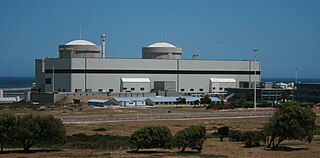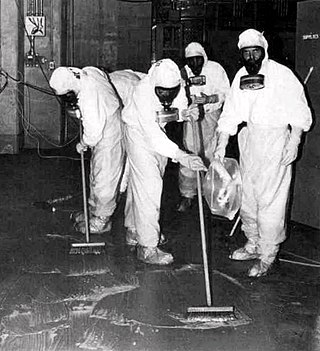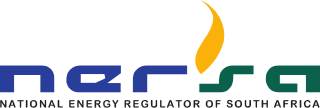
The National Nuclear Regulator (NNR) of South Africa is responsible for the regulatory framework that protects people, property and the environment from any damaging effects of ionizing radiation or radioactive material. [1]

The National Nuclear Regulator (NNR) of South Africa is responsible for the regulatory framework that protects people, property and the environment from any damaging effects of ionizing radiation or radioactive material. [1]
Its duties include the regulation of safe operating conditions for nuclear or radiation processes and the prevention or mitigation of damage from accidents. It carries out safety case reviews and assessments, authorisations, compliance inspections and enforcement of standards. It drafts regulatory documents and oversees emergency planning and preparedness. [1] Its safety standards are implemented in accordance with the recommendations of the International Commission on Radiological Protection (ICRP) and the International Atomic Energy Agency (IAEA), and it reports to the Department of Energy. [1]
In June 2021, Koeberg Alert's Peter Becker was appointed to the board of the National Nuclear Regulator. He was fired by the Minister of Minerals and Energy, Gwede Mantashe, in February 2022, citing Becker's opposition to nuclear power. [2]

The International Atomic Energy Agency (IAEA) is an intergovernmental organization that seeks to promote the peaceful use of nuclear energy and to inhibit its use for any military purpose, including nuclear weapons. It was established in 1957 as an autonomous organization within the United Nations system; though governed by its own founding treaty, the organization reports to both the General Assembly and the Security Council of the United Nations, and is headquartered at the UN Office at Vienna, Austria.

The United States Nuclear Regulatory Commission (NRC) is an independent agency of the United States government tasked with protecting public health and safety related to nuclear energy. Established by the Energy Reorganization Act of 1974, the NRC began operations on January 19, 1975, as one of two successor agencies to the United States Atomic Energy Commission. Its functions include overseeing reactor safety and security, administering reactor licensing and renewal, licensing radioactive materials, radionuclide safety, and managing the storage, security, recycling, and disposal of spent fuel.

Koeberg Nuclear Power Station is a nuclear power station in South Africa and the only one on the African continent. It is located 30 km north of Cape Town, near Melkbosstrand on the west coast. It is owned and operated by the country's state-owned electricity public utility, Eskom.
In politics, regulatory capture is a form of corruption of authority that occurs when a political entity, policymaker, or regulator is co-opted to serve the commercial, ideological, or political interests of a minor constituency, such as a particular geographic area, industry, profession, or ideological group.
The Canadian Nuclear Safety Commission is the federal regulator of nuclear power and materials in Canada.

Nuclear safety is defined by the International Atomic Energy Agency (IAEA) as "The achievement of proper operating conditions, prevention of accidents or mitigation of accident consequences, resulting in protection of workers, the public and the environment from undue radiation hazards". The IAEA defines nuclear security as "The prevention and detection of and response to, theft, sabotage, unauthorized access, illegal transfer or other malicious acts involving nuclear materials, other radioactive substances or their associated facilities".
The Koeberg Alert alliance is an anti-nuclear activist organisation which emerged from an earlier pressure group in Cape Town called "Stop Koeberg" in 1983. Both were intended to halt construction of the first nuclear power station in South Africa at Duynefontein, 28 km NNW of Cape Town: the Koeberg Nuclear Power Station.
Energoatom is the state enterprise operating all four nuclear power plants in Ukraine. It is the largest producer of electricity in Ukraine.

The Atomic Energy Regulatory Board (AERB) was constituted on 15 November 1983 by the President of India by exercising the powers conferred by Section 27 of the Atomic Energy Act, 1962 to carry out certain regulatory and safety functions under the Act. The regulatory authority of AERB is derived from the rules and notifications promulgated under the Atomic Energy Act, 1962 and the Environmental (Protection) Act, 1986. The headquarters is in Mumbai.

The Tokaimura nuclear accidents refer to two nuclear related incidents near the village of Tōkai, Ibaraki Prefecture, Japan. The first accident occurred on 11 March 1997, producing an explosion after an experimental batch of solidified nuclear waste caught fire at the Power Reactor and Nuclear Fuel Development Corporation (PNC) radioactive waste bituminisation facility. Over twenty people were exposed to radiation.
The National Calibration Reference Centre for Bioassay and In Vivo Monitoring (NCRC) is administered by the Radiation Protection Bureau of the Canadian Federal Department of Health. It was created in 1982 through a Memorandum of Understanding (MOU) signed between the regulator of the nuclear industry, the Canadian Nuclear Safety Commission (CNSC), formerly the Atomic Energy Control Board, and the Department of Health with the specific mission of providing "practical reference standards" for measurements used for internal dosimetry. Two other Reference Centres were created at the same time. These were to have equivalent roles for (1) external dosimetry and (2) radon and radioactive atmospheres, and were administered, respectively, by the Canadian National Research Council and the federal Department of Energy, Mines and Resources. The choice of the three agencies to act as Reference Centres was based on their expertise acquired over years of work in their respective fields and the fact that they operate independently of both the CNSC and the nuclear industry.
The International Nuclear Regulators' Association (INRA) was established in January 1997 and is an association of the most senior officials of the nuclear regulatory authorities of the following countries:
Vaalputs is the only South African radioactive waste-disposal facility, called the Vaalputs Radioactive Waste Disposal Facility, operated by NECSA. The facility is located about 100 km south-east of Springbok, in the Northern Cape. It covers an area of approximately 10,000 hectare, measuring 16,5 km from east to west and 6,5 km from north to south at its narrowest point.
Nuclear law is the law related to the peaceful uses of nuclear science and technology.
The Australian Radiation Protection and Nuclear Safety Agency (ARPANSA) is a regulatory agency under the Commonwealth of Australia that aims to protect Australian citizens from both ionising and non-ionising radiation. ARPANSA works under the guidance of the Australian Radiation Protection and Nuclear Safety Act of 1998 as the national regulatory body of radiation in Australia, with independent departments within each state and territory that regulate radiation within each of their jurisdictions.

South Africa is the only country in Africa with a commercial nuclear power plant.
The Office for Nuclear Regulation (ONR) is the regulator for the nuclear industry in the United Kingdom. It is an independent statutory corporation whose costs are met by charging fees to the nuclear industry. The ONR reports to the Department for Work and Pensions, although it also worked closely with the now-defunct Department of Energy and Climate Change.
In South Africa the Department of Public Enterprises is the shareholder representative of the South African Government with oversight responsibility for state-owned enterprises in key sectors. Some companies are not directly controlled by the Department of Public Enterprises, but by various other departments. Further, not all state owned entities are registered as companies.

Yau Usman Idris is a Nigerian nuclear physicist and the current director general (CEO) of the Nigerian Nuclear Regulatory Authority (NNRA). He was appointed by Muhammadu Buhari, President of the Federal Republic of Nigeria.

National Energy Regulator of South Africa (NERSA), is the regulatory authority for the electricity supply industry in South Africa.